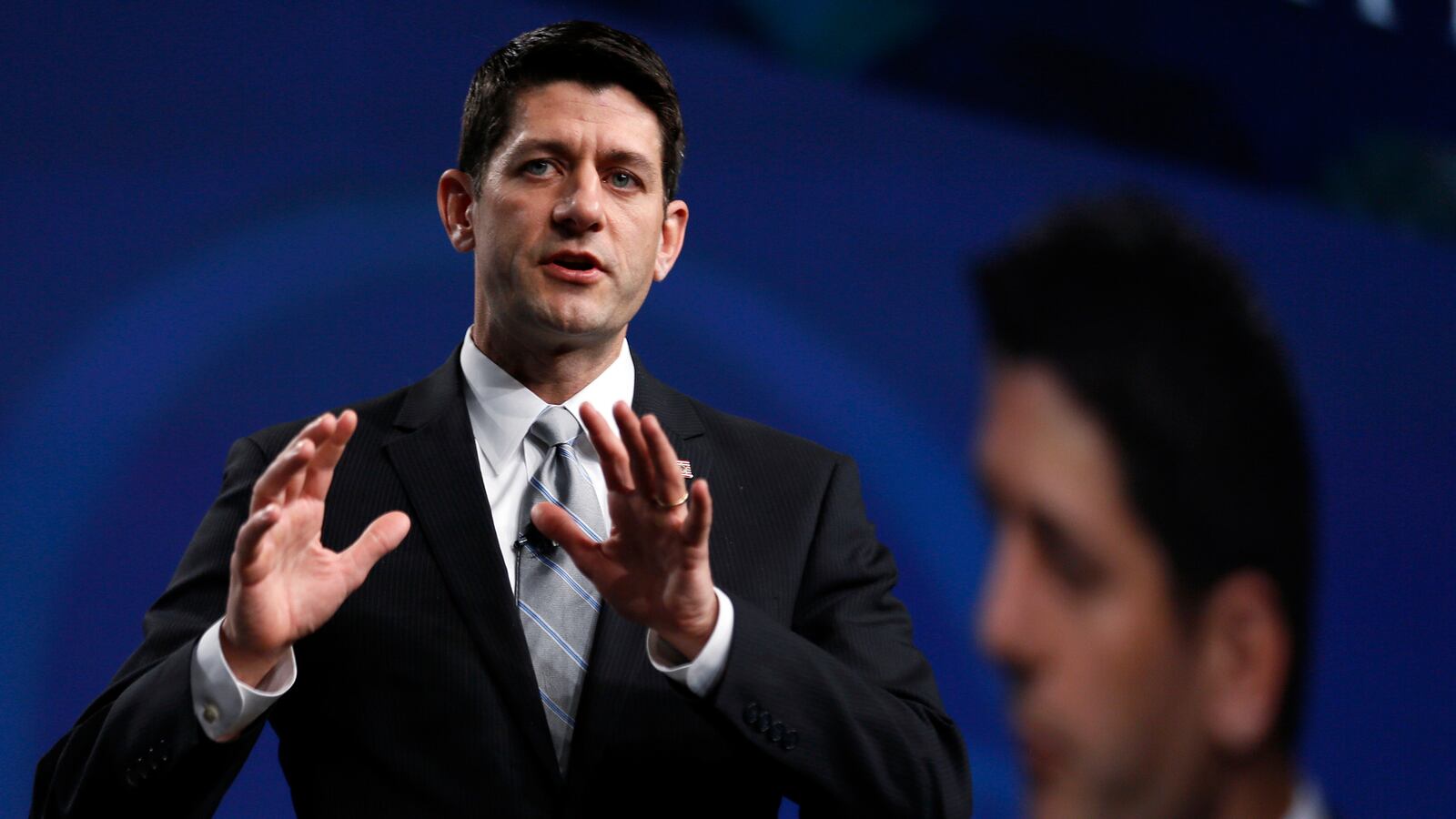After traveling around the country for the last year to better understand what works to combat poverty, Republican Rep. Paul Ryan now has a “discussion draft” with the key ideas he thinks can help the poorest Americans get ahead, and where the federal government has a role.
“Enough with politics, let’s talk solutions,” he declared, presenting a set of policy reforms that could serve as a governing agenda should the Republicans gain the majority in the U.S. Senate in November. Ryan’s plan may also be a road map for Republican presidential candidates in 2016 as they seek to present themselves as a party that does care about the least among us.
“He knows that great leaders fight for everyone no matter how they vote,” AEI president Arthur Brooks said when introducing Ryan to an audience Thursday morning packed with fresh-faced interns in Washington for the summer.
Ryan is calling for a pilot program of “Opportunity Grants” that would consolidate 11 federal programs into one stream of funding to states. Food stamps, cash welfare payments, housing assistance and a host of other benefits would be packaged together, and a state that chooses to participate would get the same amount of money, but would have flexibility in choosing how it is allocated.
AEI’s Robert Doar, moderating a panel immediately after Ryan’s talk, raised a red light about food stamps being part of the package. The long standing program has become a lightning rod on Capitol Hill, and any attempts to let states tamper with allocating food stamp money is likely to be fiercely resisted by Democrats. But giving states more flexibility to tailor benefits to individual needs is a central part of Ryan’s reform agenda.
Two other scholars, Ron Haskins from Brookings and Stuart Butler with Heritage, used the term “block grants” interchangeably with Ryan’s opportunity grants. Block grants have long been a cherished GOP idea, and Ryan insisted that what he’s offering is different from “a garden variety block grant where you cut a check and call it a day.” He envisions local groups working on the front lines, from Catholic Charities to America Works, delivering customized services with a neutral third party evaluating results.
Robert Woodson with the Center for Neighborhood Enterprise, who Ryan identified as his mentor, said not everyone is poor for the same reason. While the left sees “a sea of victims” the right sees “a sea of aliens.” Everyone is redeemable, he says, it just takes different strategies. “Eighty percent of my best friends are ex-something or other and these are people I have taken Paul around the country to see,” he said. People rebuilding their lives after prison are “the healing agents, the antibodies,” he said.
While Ryan’s opportunity grants are likely to generate the most controversy, he included several other ideas that have great potential for bipartisan support. He would increase the Earned Income Tax Credit, a program first introduced by President Reagan, to better cover childless adults, a reform similar to what President Obama proposes. Ryan would expand access to education, break up the “college cartels,” and reform accreditation. “Sounds dry, but it’s a huge difference,” he said.
Criminal justice reform is on Ryan’s list, and it has strong backing from the left and the right. “Give people a chance to earn a second chance,” Ryan said, citing bipartisan legislation sponsored by Republicans Mike Lee and Raul Labrador and Democrat Bobby Scott. Their bill would give judges more discretion in sentencing first time, nonviolent offenders.
Finally, there is regulatory reform, which is a surprisingly minor piece of the Ryan package considering how strongly Republicans oppose government regulations. If a regulation would create an undue burden on low-income families, a federal agency would be required to get congressional approval. Ryan did not go into detail on what an “undue burden” would be.
Ron Haskins from Brookings paid Ryan the ultimate compliment, calling his proposal “worthy of a think tank.” Almost everything in it has potential for bipartisan support, he enthused. “If we take the Senate, we can put something on the president’s desk.” Haskins is affiliated with the liberal Brookings Institution, but he worked on poverty issues in the Bush White House. Ryan grinned, “Thanks for saying ‘we,’ especially coming from Brookings.” It’s a pronoun that his proposal is meant to trigger more of.





